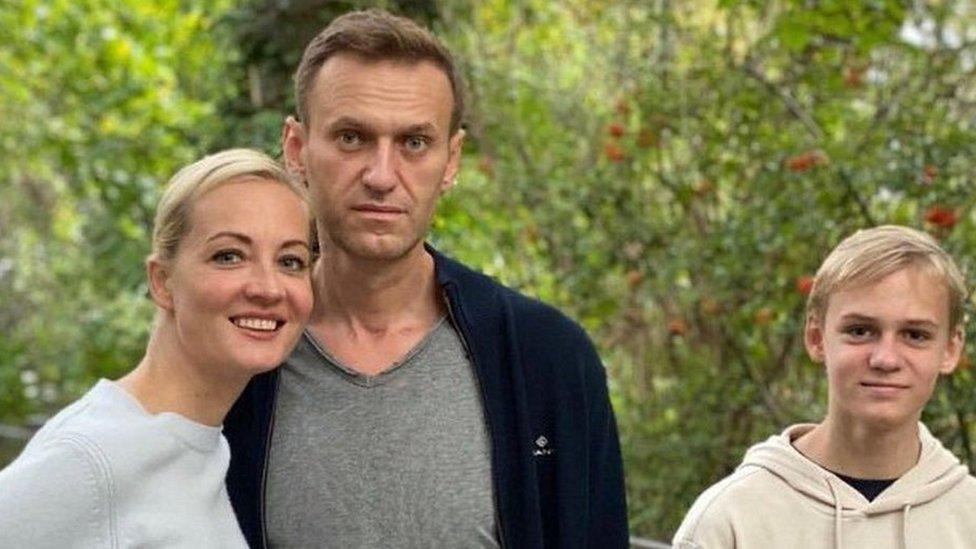'Let him go!' - Navalny activists defy bitter Russian cold
- Published
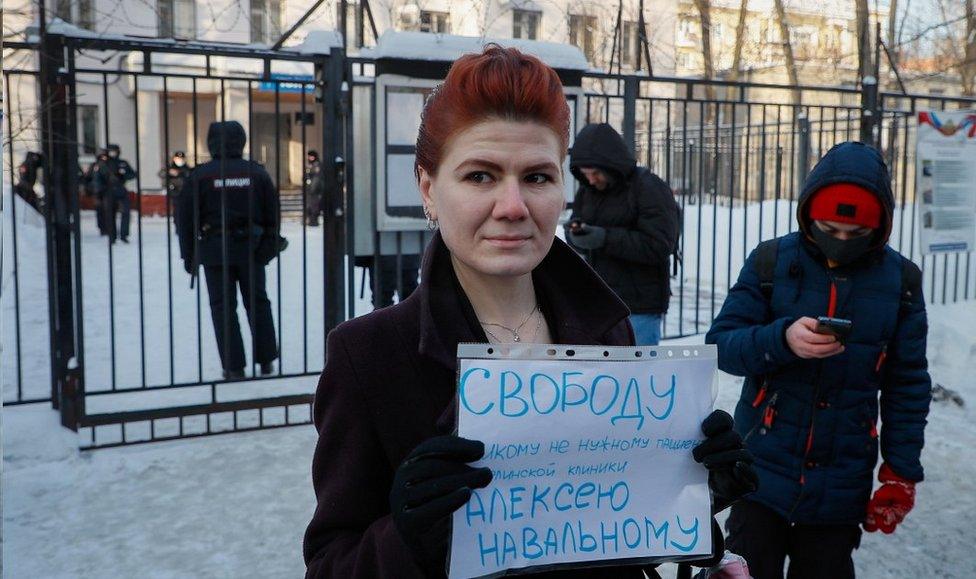
Councillor Antonina Stetsenko demands Navalny's release outside Khimki police station
"Let him go!", "Russia will be free!", "Lyosha, we are with you!" chanted hundreds of Alexei Navalny's supporters, who turned up outside a Moscow police station on Monday, despite the -20C cold.
They were mostly students, young professionals and NGO activists. "Lyosha" is the familiar short form of Alexei.
The Khimki police station, on the northwestern edge of Moscow, was hastily converted into a courtroom to receive Russia's best-known opposition activist. A judge ordered that he stay in custody for at least 30 days.
Mr Navalny - survivor of a near-fatal nerve agent attack last August - was detained soon after his plane landed in Moscow on Sunday. Despite the risk, he insisted on returning to Moscow from Berlin, to continue his anti-corruption campaign against President Vladimir Putin.
There were chaotic scenes when his plane was diverted from Vnukovo - the airport where his supporters had gathered - to Sheremetyevo, which is near Khimki.
His supporters believe his detention shows how worried the authorities are about his potential to change the balance of power in Russia.
His anti-corruption network targets a mainly young audience on social media, with videos on YouTube and Instagram watched by tens of millions, rivalling Russian state TV.
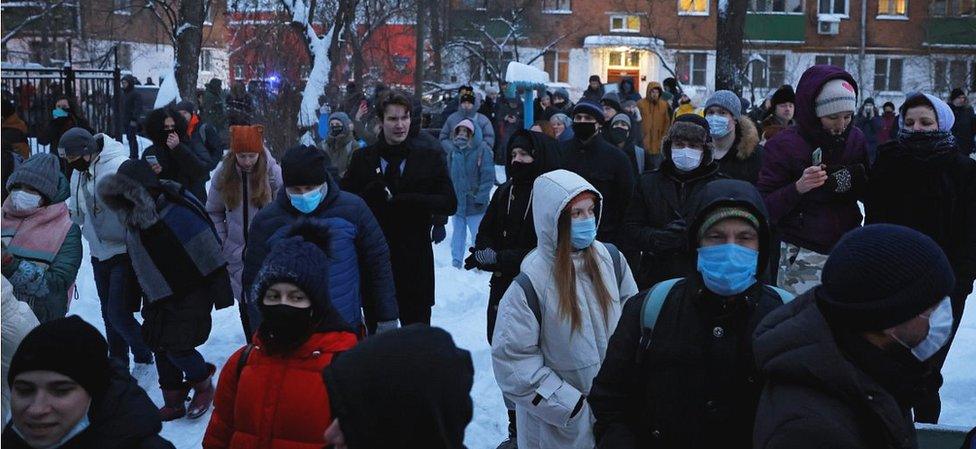
Many young Navalny supporters gathered in Khimki
The protesters in Khimki included local councillor Antonina Stetsenko, holding a poster demanding freedom for Mr Navalny, in a solo picket outside the gates.
Solo pickets have become a common form of protest, as the penalties for staging mass protests have got tougher in Russia. Other protesters showing solidarity with Mr Navalny in Khimki on Monday were more dispersed, so better able to flee the police if necessary.
Mr Navalny is accused of violating the terms of a suspended sentence he received for embezzlement - a case he rejects as fabricated in order to silence him.
Alexei Navalny was filmed by the BBC saying goodbye to his wife and then being led away by authorities
The protesters included Tatiana Usmanova from the NGO Open Russia, a pro-democracy group set up by ex-oligarch Mikhail Khodorkovsky, who famously fell out with President Putin more than a decade ago.
She described how local people came out to ask about Mr Navalny and brought hot tea and sandwiches for those outside in the freezing cold.
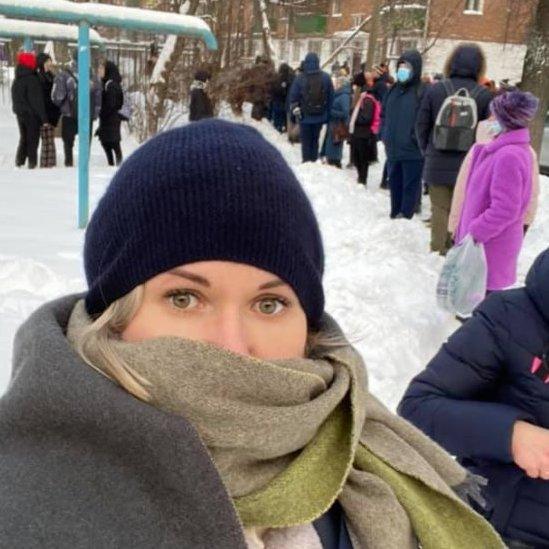
Tatiana Usmanova - showing solidarity with Mr Navalny

"Khimki is our new Minsk!" she wrote on Facebook, external, referring to the months of mass protests in the capital of Belarus. Those protests have not removed President Alexander Lukashenko, a Putin ally, but have brought international condemnation down on him.
"It is -20C outside, so it's hard to stay out for more than 20 minutes at a time. Local people are letting us warm up inside their blocks of flats!" Usmanova wrote.
Poisoning 'the last straw'
On Sunday a prominent film director - Vitaly Mansky, whose Putin's Witnesses was shown at the London Film Festival in 2018 - turned up at Vnukovo to greet Mr Navalny on his return.
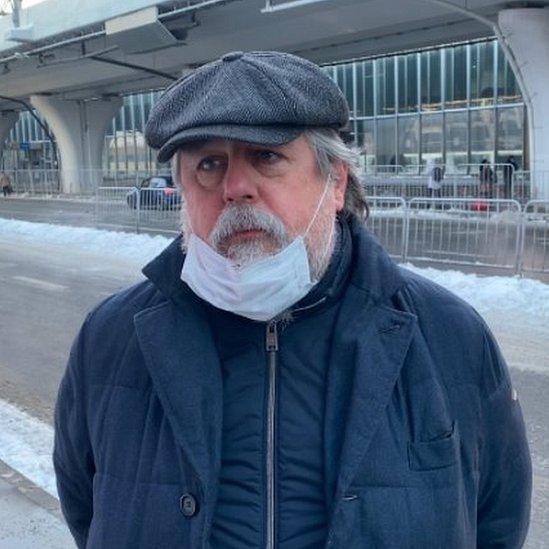
Film director Vitaly Mansky: Authorities are "terrified" of Mr Navalny

He said the heavy police presence at the airport showed the authorities' concern about Mr Navalny's popularity.
"They can detain him or arrest him, or take him away, but this movement cannot be slowed down or broken. I am here to witness historic moments. The fact that the authorities are so terrified of him is great, I am glad. Their fear is bringing their end closer," he told BBC Russian.
Many who support Mr Navalny complain of a lack of respect for the rule of law. His poisoning and the Bellingcat investigation, which pinned the blame on FSB state security agents, proved a turning point for many.
"I'm not all that political, but this was the last straw." BBC journalists heard that comment from many people, who said that seeing proof that a Russian citizen could be attacked on Russian soil had forced them to change their opinion.
President Putin has dismissed Mr Navalny as an "unimportant blogger" and the Kremlin denies involvement, and rejects the Western conclusion that Novichok - an extremely toxic Russian nerve agent - was used in the attack last August.
Pop songs
A large crowd of Navalny supporters gathered at Vnukovo to greet him on Sunday, before his plane was diverted.
The authorities were taking no chances: about 10 large police vans parked close to the terminal and the international arrivals zone was cordoned off from the rest of the airport.
Many people who came to meet friends and relatives were left outside, waiting in the freezing cold. One man had come to meet his girlfriend arriving from Turkey. "This is fascism!" he shouted.
Inside, a different crowd appeared - young people who said they were fans of Russian Instagram star and pop singer Olga Buzova.
But it was not clear why her fans - singing some of her hits - were there at the same time as Mr Navalny's supporters. According to Buzova's social media, she was spending the day in St Petersburg and had no plans to return to Moscow that evening.
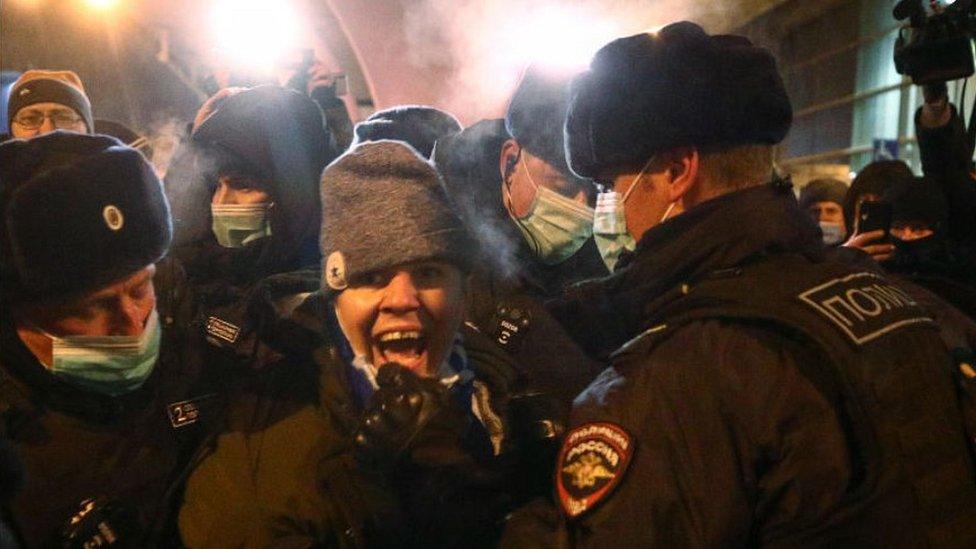
Police detained Navalny supporters at Vnukovo airport - but the plane didn't land there

About 60 people were reportedly detained at Vnukovo and some complained of rough treatment by the police.
By the time his plane had landed at Sheremetyevo about 50 supporters had got there to greet him.
But his wife Yulia only managed to snatch a kiss before police led him away. She told the people around her: "Thank you for coming here and earlier to Vnukovo.
"They are so afraid of Alexei that they have paralysed all flights into Moscow this evening, inconvenienced so many people. He is just a man who came back home. The most important thing Alexei said this evening is that he is not afraid. And I am not afraid. And I call on you not to be afraid."
The BBC's Kateryna Khinkulova contributed to this piece.
Related topics
- Published19 January 2021
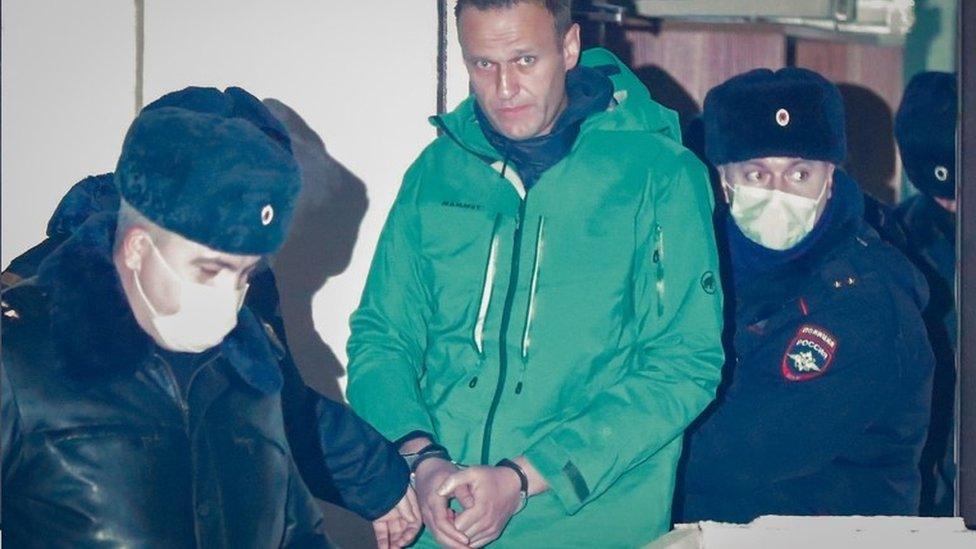
- Published16 February 2024
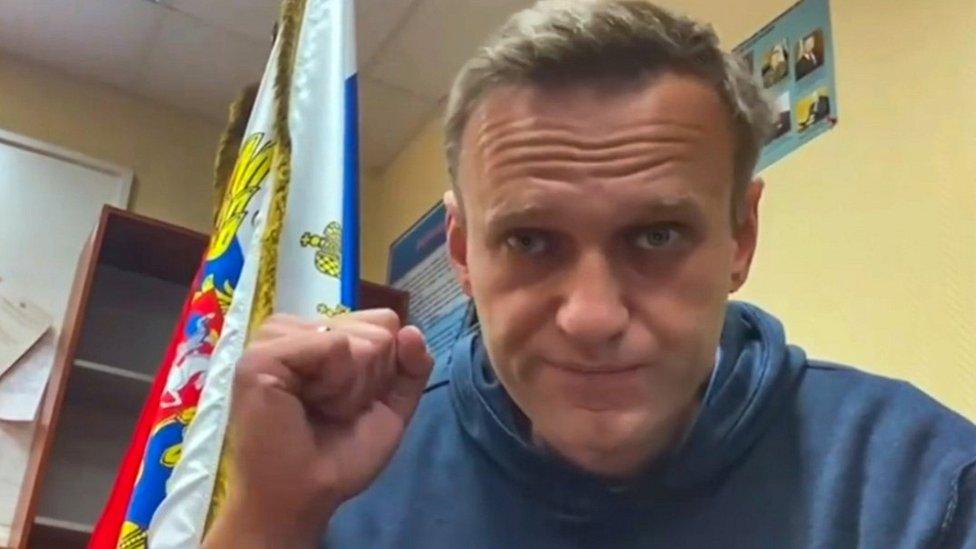
- Published7 October 2020
